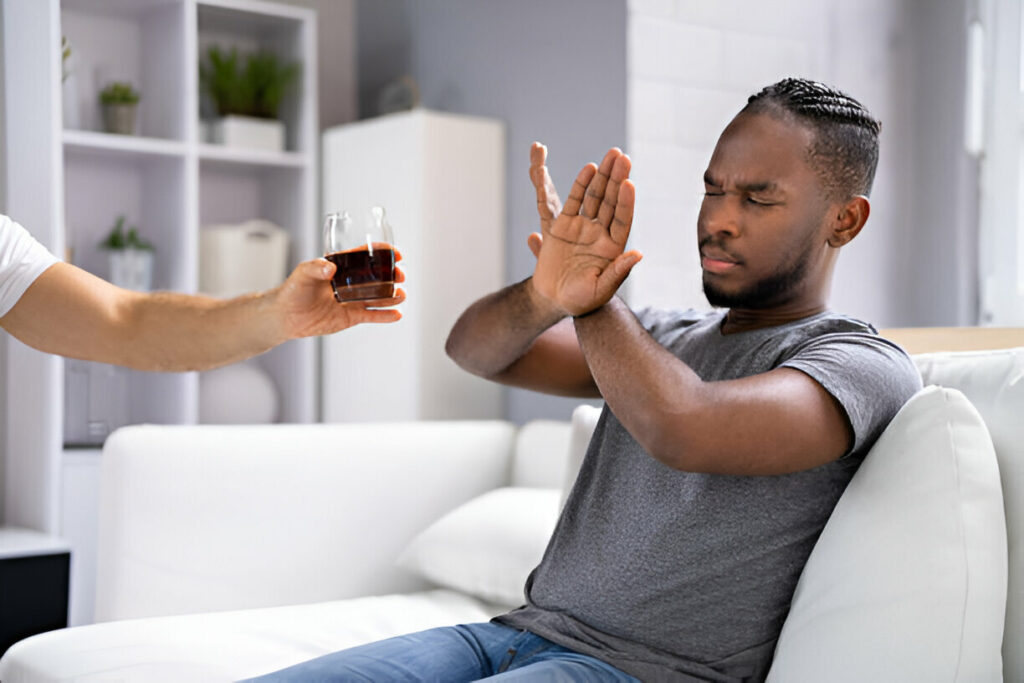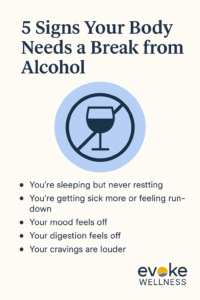It doesn’t have to be a rock-bottom moment.
Sometimes it’s just a string of mornings that feel heavier. A stomach that never seems settled. A quiet but persistent voice inside that wonders: Would I feel better without this?
If that sounds like you, you’re not alone—and you’re not overreacting. Drinking doesn’t have to be “out of control” for it to be messing with your body. In fact, some of the most important signals are the ones we brush off. They’re subtle. Easy to explain away. But your body keeps speaking until you listen.
Here are five signs that might be showing up in your life—ways your body could be telling you it needs a break from alcohol.
1. You’re Sleeping But Never Resting
One of the first things I noticed before taking a break from drinking was how tired I always felt. Not just sleepy—worn out. Even on nights when I got 8 hours, I’d wake up foggy. Coffee didn’t touch it.
Here’s why: Alcohol disrupts your natural sleep cycles. Even if you fall asleep faster, you’re skipping the deep, restorative stages of sleep. Your brain and body don’t get a chance to fully recharge.
If you’re waking up groggy, mentally scattered, or needing naps to get through the day, your body may be trying to recover from nightly alcohol use. Rest isn’t just about quantity—it’s about quality. And alcohol steals that from you.
2. You’re Getting Sick More or Feeling Run-Down
Alcohol has a sneaky way of weakening your immune system. I didn’t notice it at first. It was just a couple more colds, a stomach bug I couldn’t shake, or a lingering soreness from workouts that used to feel easy.
When you drink regularly, your body has to use energy to process and detox the alcohol—energy that would otherwise go toward keeping you healthy. That leaves you more vulnerable to viruses, inflammation, and general blah-ness that can make everything harder.
If you feel like you’re always coming down with something or just don’t bounce back like you used to, it could be more than just getting older. It might be the alcohol.
3. Your Mood Feels Off—and You’re Not Sure Why
There’s a name for the emotional crash after drinking: “hangxiety.” It’s that shaky, uneasy, low-energy feeling that creeps in the morning after—or even two days later.
Alcohol interferes with neurotransmitters like serotonin and dopamine. These are the same brain chemicals that regulate mood, motivation, and a sense of well-being. So when drinking becomes regular, your brain struggles to find balance. That can lead to anxiety, irritability, and even depression.
I used to blame work stress, relationships, or just being “in a funk.” It took a long time to realize that my mood swings weren’t random. They followed a pattern—and alcohol was a major part of it.
4. Your Digestion Feels Off—or Your Gut Is Speaking Louder Than Usual
Alcohol is rough on your digestive system. It irritates the stomach lining, throws off gut bacteria, and slows down digestion. Over time, that can lead to bloating, irregular bathroom habits, acid reflux, and general discomfort.
For me, it was subtle: A tightness in my stomach that wouldn’t go away. A sense that food wasn’t sitting right. A heaviness that lingered. I thought it was stress—but when I stopped drinking, it disappeared. Completely.
If your stomach is talking to you more lately, it might be time to consider what it’s reacting to.
5. Your Cravings Are Louder—and More Frequent
Maybe it started as a glass of wine to unwind. Then it became a nightly ritual. Then it started showing up earlier, or on days you said you wouldn’t drink.
This is often the most telling sign. When alcohol goes from optional to automatic, it’s a signal that your body (and brain) are building tolerance. You need more to feel the same. Or you feel uncomfortable without it.
That doesn’t mean you’re “an alcoholic.” It means your body is adjusting—and not necessarily in a good way. Cravings don’t show weakness. They show that your body is adapting to something it wasn’t meant to rely on.
Want to Feel Better—Without Labels or Pressure?
Here’s what I wish someone had told me sooner: You don’t have to wait until you “have a problem” to take a break from drinking. Feeling off is reason enough. Wanting clarity, energy, or just a reset is reason enough.
And if it turns out your body needs more than just a few dry weeks—if stopping feels harder than you expected—you still have options.
Evoke Wellness Ohio’s alcohol detox center in Columbus offers safe, supportive medical detox that doesn’t come with shame, judgment, or pressure to commit to anything long-term.
Call (866) 430-9267 to talk through what care could look like. No scripts. No obligations. Just honest support.
FAQs: Alcohol Detox and Your Body’s Signals
What is alcohol detox, and do I need it?
Alcohol detox is the process of allowing your body to safely withdraw from alcohol under medical supervision. If stopping alcohol suddenly causes shakes, nausea, anxiety, or other symptoms, detox can keep you safe and supported.
You don’t have to be drinking “a lot” for your body to need help coming off alcohol.
Can I do a detox at home?
It depends on how much and how often you’ve been drinking. Mild symptoms can often be managed with rest and hydration. But for regular or heavy use, detoxing at home can be dangerous. Medical detox ensures you’re monitored for things like seizures or heart issues—and you’ll have medication if you need it.
What’s the difference between a detox center and rehab?
A detox center like ours in Columbus, Ohio, helps you through the first few days of stopping—when withdrawal symptoms are at their peak. Rehab usually refers to longer-term treatment, including therapy and behavioral support. Detox is often the first step, not the whole journey.
Do I have to commit to long-term treatment?
No. Detox is just that: a clean, safe starting point. At Evoke Wellness Ohio, we’ll talk through your options once you’re feeling clear. There’s no pressure. Just possibilities.
How do I know if it’s “bad enough” to get help?
If you’re asking the question, that’s enough. You don’t need to fit a stereotype or wait for a crisis. If your body is sending signals—or if your heart just wants something different—we’re here to help you figure out what’s next.



